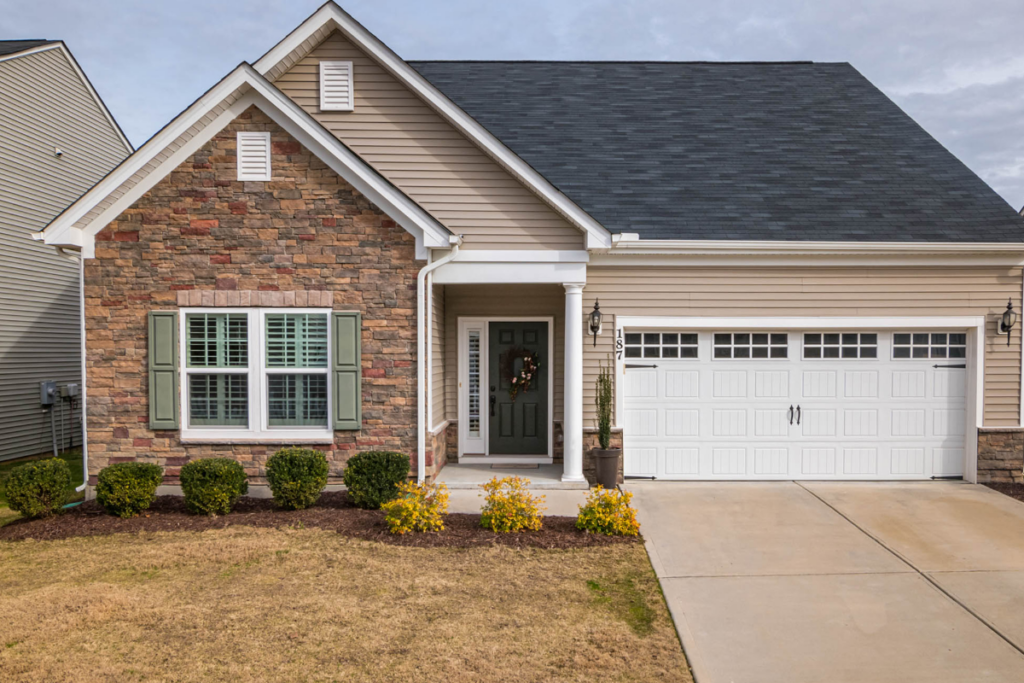For most first-time buyers in the UK, the idea of owning a home can feel like a distant dream. Property prices are rising faster than many people’s ability to save, especially with the cost of living at an all-time high. Getting that first foot on the housing ladder can seem overwhelming—how do you even begin?
The UK government recognizes this struggle and, in an effort to help more people become homeowners, introduced the First Homes Scheme. Designed specifically for first-time buyers, it offers a discount on new-build homes, making them more affordable. But is it really the golden ticket for new buyers? Let’s dig a little deeper into how this scheme works, who it’s for, and whether it could be the opportunity you’ve been waiting for.
So, What Exactly is the First Homes Scheme?
The First Homes Scheme is pretty straightforward, and it’s exactly what it sounds like: a way to make your first home more affordable. The scheme provides a 30% to 50% discount on the market value of new-build properties. It’s designed to help first-time buyers like you get onto the property ladder sooner than you might think possible.
Think about it like this: Let’s say the average house in your area costs £300,000 (which is a pretty common number these days). With the First Homes Scheme, you could end up paying just £210,000 if you get the full 30% discount—and even less if you qualify for a larger one! For many buyers, that’s a game-changer. You’d need a smaller deposit and a smaller mortgage, which ultimately means more manageable monthly payments.
However, there’s more to this scheme than just a simple discount. One of its unique features is that the discount stays with the property. So, if you eventually decide to sell the home, the next buyer also benefits from the same discount you received. In this way, the scheme ensures that homes remain affordable for future first-time buyers too, creating a ripple effect of opportunities.

Who is the First Homes Scheme For?
First off, the scheme is intended specifically for first-time buyers—meaning, this is the first time you’re purchasing a property, either in the UK or anywhere else. If you’ve previously owned a home, unfortunately, this isn’t the scheme for you.
Now, being a first-time buyer is just the starting point. There are other eligibility criteria that you’ll need to meet:
- Income Cap: Your household income must not exceed £80,000 per year (or £90,000 in London). This makes sure that the scheme is targeted at those who need the financial help the most. If you earn more than that, you may need to explore other schemes like Shared Ownership or Help to Buy.
- Mortgage Requirement: You’ll need to take out a mortgage for at least 50% of the purchase price of the home. The idea here is to ensure that buyers are serious about homeownership and have some financial commitment to the property.
- Local Preferences: Some areas have additional local eligibility rules. For instance, local councils may give preference to people who already live or work in the area or to key workers like nurses, teachers, or police officers. If you’re in one of these categories, it could give you an advantage in securing a home.
If you tick these boxes, then you could be well on your way to owning your first home with a significant discount!

How Does the First Homes Scheme Work in Practice?
Here’s how the process typically goes if you’re interested in the scheme:
- Find a Property: The first step is to look for new-build properties that are part of the First Homes Scheme. Not every new-build home is included, so it’s essential to check with local developers or your council to find which homes qualify. Developers often highlight these properties on their websites or in marketing materials.
- Apply for the Scheme: Once you’ve found a home you’re interested in, you’ll need to apply through your local authority. They’ll check your eligibility to ensure you meet the income and first-time buyer criteria, as well as any local residency or key worker preferences.
- Secure a Mortgage: After you’re approved, it’s time to get your mortgage sorted. Because of the discount, your mortgage will cover a smaller portion of the home’s value, which can make the monthly payments more affordable. Keep in mind that even though you’re getting a discount, you’ll still need a deposit and to meet standard lending criteria from your bank or mortgage provider.
- Finalizing the Purchase: Once everything is in order, the sale process goes ahead just like any other property transaction. You’ll complete the legal paperwork, make the necessary payments, and finally, you’ll get the keys to your new home.
It’s worth noting that, although the purchase process is similar to buying a regular property, there may be a few extra steps involved due to the involvement of your local authority and the scheme’s specific rules. So, patience is key!

Why Choose the First Homes Scheme?
It’s natural to wonder whether the First Homes Scheme is the best option for you. After all, there are other ways to buy a home, such as Help to Buy or Shared Ownership. So, why pick First Homes?
Here’s what makes it stand out:
- Significant Discounts: One of the biggest draws of the First Homes Scheme is the large upfront discount. Getting up to 50% off the market price makes homes much more affordable, especially in areas where prices are otherwise sky-high.
- Full Ownership: Unlike Shared Ownership, where you only own a portion of the property and pay rent on the rest, the First Homes Scheme allows you to own 100% of your home outright from day one. There’s no need to “staircase” your way to full ownership.
- Long-Term Affordability: The resale condition—where you must sell the property at the same discount you received—ensures that the home stays affordable for future buyers. This means that your home continues to contribute to affordable housing in the community.
However, the scheme isn’t for everyone. Some buyers might prefer other options depending on their situation, such as those who can’t secure a large enough mortgage or those who prefer to spread out the costs by starting with a smaller ownership share, like in Shared Ownership.
How Does the First Homes Scheme Compare to Other Schemes?
With several government-backed housing schemes available, you might be wondering how the First Homes Scheme compares to alternatives like Help to Buy and Shared Ownership. Let’s take a closer look at how they stack up.
Help to Buy Equity Loan
The Help to Buy Equity Loan scheme has been a popular option for first-time buyers in the UK. It works by providing a government loan of up to 20% (40% in London) of the property’s value, which is interest-free for the first five years. Buyers only need a 5% deposit, and the rest is covered by a mortgage.
While this scheme sounds appealing, it has its limitations when compared to the First Homes Scheme:
- Loan Repayment: With Help to Buy, you’ll eventually have to repay the loan. After five years, interest starts accruing, which means your costs will rise over time. By contrast, the First Homes Scheme offers a discount upfront, with no loan to repay later.
- Property Price Growth: If house prices rise, the amount you repay on your Help to Buy loan increases, as the loan is based on a percentage of the property’s value. With the First Homes Scheme, you won’t have this concern—you benefit from price growth (though your home will always be sold at the discounted rate).
Help to Buy can be a good option for those who need a lower deposit to buy a home, but it comes with long-term financial commitments that may not suit everyone.

Shared Ownership
With Shared Ownership, buyers can purchase between 25% and 75% of a property and pay rent on the remaining share. Over time, you can buy additional shares (known as “staircasing”) until you eventually own the entire home.
Compared to the First Homes Scheme, here are some key differences:
- Ownership: With Shared Ownership, you only own a portion of the home to start, and you’ll have to pay rent on the rest. With the First Homes Scheme, you own the entire home from the beginning.
- Cost Over Time: While Shared Ownership allows you to buy more of the property over time, you’ll need to pay rent alongside your mortgage until you own 100%. The First Homes Scheme simplifies this by offering full ownership at a reduced price upfront.
Shared Ownership might be a better fit if you can’t afford a full mortgage immediately, but for those looking for simplicity and full ownership, the First Homes Scheme is likely the better option.
Are There Any Downsides to the First Homes Scheme?
While the First Homes Scheme offers many advantages, there are a few things to be mindful of:
- Limited Availability: Not all new-build homes are part of the scheme. Depending on where you’re looking, the number of properties available might be limited, which means you may need to act quickly if you find one that fits your criteria.
- Resale Conditions: When it comes time to sell, you’ll have to sell the property with the same discount you received. While this helps keep homes affordable for future buyers, it can limit your potential profits if house prices in your area rise significantly.
- Mortgage Availability: Since you must take out a mortgage for at least 50% of the property price, this scheme might not be suitable for those with lower incomes who can’t secure a large enough mortgage.

Conclusion: Is the First Homes Scheme Right for You?
The First Homes Scheme is a fantastic opportunity for first-time buyers in the UK. By offering a significant discount on new-build properties, it makes homeownership more accessible to people who might otherwise be priced out of the market. If you meet the eligibility criteria and find a home in the right area, it could be the key to finally owning your first home.
That said, it’s essential to consider your own financial situation and future plans. Like any scheme, it’s not a one-size-fits-all solution. But for many, the First Homes Scheme represents an exciting and viable path to homeownership, providing long-term affordability and stability.
To get started, check your local council’s website or reach out to housing developers in your area to find out which properties are available under the scheme. You might be closer to owning your first home than you think!
To avoid confusion due to fluctuating real estate prices, please note that the house prices mentioned in this article were accurate at the time of publication. Prices may change over time, so readers should verify current property values before making any decisions.





